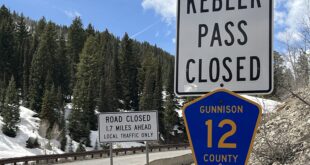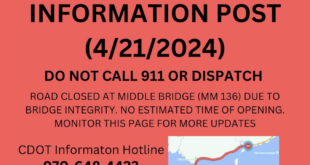Feeling to go “old school Crested Butte” and work together
[ by Mark Reaman ]
A general softening from both sides over a so-called Community Preservation Fee appeared to take place at the Crested Butte town council discussion Tuesday night. After listening to both Crested Butte second homeowners and to Crested Butte locals struggling to secure long-term living situations, common ground was reached that perhaps an empty house tax wasn’t the best and only way to fund a slew of items suggested by the staff. Instead, a “reasonable fee” could be accepted by those who don’t live in Crested Butte year-round to help finance more housing stock.
More detailed discussion on what would be considered a reasonable fee, likely in the form of an empty house tax, what the money would be specifically used for and how long the fee would be in existence will take place on Tuesday, August 10 at 6 p.m. Whether to ask voters to also approve a sales tax increase on the same November ballot will also be discussed.
Crested Butte community development director Troy Russ and town finance director Rob Zillioux made a lengthy PowerPoint presentation on the benefits of forming a Community Preservation Fund financed primarily through an empty house tax and how such policy adjustments would “preserve the essence of Crested Butte community.”
They pointed out the rapidly increasing housing prices compared to relatively stagnant wages has put a free market house in the North Valley out of reach for working locals. They said 2012 was the last year an average worker could reasonably afford a place in town. They postulated that by charging an empty house tax, some units on the lower end, for example condominiums and mobile homes, would be sold instead of the owners paying the tax and a portion of those units could end up being sold back to working locals.
“We want people to be able to live, work and raise a family here,” said Russ. “The market won’t allow that so government has to create a policy.”
Of all the funding options that included a property tax increase, a sales tax increase, an increase in the short-term rental excise tax, or using a bond issue to obtain funds, Zillioux said the Community Preservation Fee was the only one that addressed that big picture and went beyond raising revenue.
“No other policy change has been identified to influence the market and this one does,” said Russ.
Numbers and use
They both emphasized the benefit of having a consistent revenue flow to put into housing and other forms of community preservation. Those included the idea of spending some of the money on affordable housing, open space, climate action initiatives, local business support, arts and historic preservation. Zillioux said council would allocate the money every budget cycle in a public budget process.
Staff numbers showed that if all second homes were assessed an annual $10,000 fee, $3.9 million could be raised. At $5,000 it would bring in $1.9 million. If only houses used as second homes purchased since 2012 were included, the $10,000 fee would generate $1.5 million and the $5,000 fee, $795,000.
“This is high stakes poker,” said Zillioux. “We need real money to be in the game.”
More second homeowners attended and spoke at the Tuesday meeting than at previous discussions about the fee.
“Second homeowners would rally around a solid affordable housing plan,” said Robert Johnson. “Second homeowners want to be part of the solution. Perhaps consider appointing a second homeowner representative as a nonvoting member of council to keep communications open. But we need a long-term growth plan for the upper valley. The second homeowners are your neighbors and a second homeowner tax pits one group against the other when we all should be working together for a solution. And there is no simple solution. It’s tough.”
“We believe in the need for affordable housing but remember it’s not just a town issue, it’s a county issue,” said Bob Kaufman. “I do find it objectionable that second homeowners can’t vote on a tax that would impact them. Is that even legal?”
“Second homeowners want local affordable housing here,” said Jim Day. “But we’d like to see everyone pitch in. We feel part of the community and it is a community issue. Why aren’t primary members of the community being asked to pitch in? Being a retiree, a $10,000 annual fee would be hard to do for someone like me.”
“It feels like a tone of ‘eat the rich’ has emerged from this,” noted Alex Gruzen. “I can afford such a tax but would want detailed specifics of what it would go for. It needs to be fair and reasonable across the population. I think we all need more data and to really look at all the alternatives. The campaign has to be defensible because there is a good chance you could find yourself in a lawsuit and whether you win or lose, it would be expensive if that happened. Mitigate that by having a specific purpose and build a case on why and how it will build the housing stock. We all understand the need.”
Ben Wright has been picketing at the Four-way Stop advocating for housing locals and has engaged with a lot of people. He told the council that he is seeing that many second homeowners are very concerned about the housing situation.
“I’m hearing that the Valley Housing Fund hasn’t reached out to that group,” he said. “I feel if you go to a tax right away it could pit second homeowners against locals and I’m afraid of that. I think the housing fund could pull in $25 million because these people want to help. I like the old school Crested Butte way where we reach out and ask one another for help instead of implementing a tax. I also fear the taxation without representation aspect.”
Another member of the audience also suggested other alternatives might be considered before an empty house tax. “We are asking second homeowners who don’t get to vote to pay a tax so it seems fair to ask why do that if we all aren’t willing to put at least some skin in the game,” she said.
“Seeing a bunch of second homeowners and a bunch of locals in the crowd tonight tells me we can all work on a solution together,” said Cole Thomas. “It is better to go ‘Us And Them’ instead of ‘Us Versus Them.’ But a consistent revenue stream is important and something should be on the ballot this fall. We don’t want to create a divide so let’s keep talking about what would work. I favor using a fee on empty homes properties purchased since 2012. Maybe we increase taxes on VRBOs. Perhaps we cut the number of short-term rental licenses in town to 50 and work to decrease the number of visitors even more. Work to get a developer to build a hotel.”
Haden and John Spencer have led an effort to engage second homeowners since the town wasn’t doing it. She said while there are still concerns, many second homeowners were open to helping to finance a means to mitigate the housing crisis. “Based on the feedback there is a huge need for dialogue and a huge need to work together. It is old school Crested Butte,” she said. “At the end of the day we can come together. We have come to the conclusion that it could work with a reasonable fee and with a sales tax that is shared by everybody. If the fee is reasonable, second homeowners will continue to support the local nonprofits. Everyone understands the need to support housing and support businesses with their employee issues.”
When asked, she said a $5,000 or $10,000 annual fee seemed high but indicated something closer to $2,500 might be more reasonable and acceptable.
John Spencer said while Haden was the emotion he was the numbers guy. “We put together some basic pro formulas and a sales tax increase in conjunction with some sort of reasonable fee on second homes could work. There is support for that,” he said. “Probably $20 million could be raised which is a hell of a lot of money and that could be leveraged to $200 million. We can solve this in a broad-based community if everyone comes together.”
“The clear goal of the staff is to get owners of lower end condos and mobile homes to sell their property and I don’t think it will work as much as they think,” said Brennan Reilly. “My mobile home is not an investment, it is a home. We want to help solve this problem together.”
“I feel like a sales tax is counterproductive to the overall cost of living,” said car camper Adam Maestle. “If second homeowners agree there is a crisis then rent me a bedroom and then you won’t have to pay the tax.”
“I don’t want it to sound divisive but I appreciate the staff’s solution to a problem,” said Beth Goldstone who said she represents the middle class and lives in deed restricted housing. “I like the sustainable funding aspect.”
“The wide use of the money concerns me since only a portion is set aside for housing,” said Gil Freelander. “The rest is too discretionary. We need a plan. I’m very interested in supporting affordable housing and want it to succeed but want a plan for the region.”
Lindsey Freeburn said she would like to see the funds primarily directed to the conceptual Indeed Program that would pay owners of existing houses to put a deed-restriction on the property. She also advocated using some money for the proposed Sixth and Butte housing project. “I think there are funding options that aren’t divisive,” she said, “Maybe the community sets the goal to raise $4 million a year and if it isn’t met then we go to a tax.”
Behind the scenes action?
Cass Rea said he and a group of locals have just recently formed a non-profit organization with the intention to focus on the housing problem. “I see both sides of this,” he said. “With this new non-profit, we are prepared to help facilitate this. Think of it as an ambassador. This discussion tonight is the best I’ve seen in years. We really are ready to meet you (second homeowners) halfway even if someone was mean to you on Facebook. So let’s talk.”
Kyleena Falzone said she too had been working on the issue and been meeting with possible investors interested in helping. “We are close to a possible short term solution,” she said. “This tax idea is a little dangerous. Be careful with that idea. There is a group that wants to help and is ready to make a substantial contribution. There are so many smart, creative, CEO types out there that love this place. There’s no need to be divisive. There are people that are ready and want to help. They understand the situation and want to go out with their friends to restaurants. Don’t push them away.”
“I do fear the tax could create more divisiveness and we don’t need more of that,” said Martha Keene. “We all here need to keep the conversations going and help raise awareness. It’s been a great conversation tonight but a lot of people need more education.”
Council feedback
Councilmembers all expressed gratitude for the dialogue and particularly the work put in by the Spencers.
Councilmember Mona Merrill said she liked the idea of a second homeowner liaison to the council.
Councilmember Will Dujardin said he hoped the word “divisive” could stop being used. He appreciated the Spencer information and was pleased to see some second homeowners could get on board with a fee for housing. “We can’t depend on donations but those can be used to close a gap on a project,” he said. “A fee on a house without a long-term rental is what I support. We need to give people a chance and the Community Preservation Fee does that.” He said in a spirit of collaboration he would support a sales tax question on the same November ballot as the Community Preservation Fee but wanted the money raised focused on housing.
Councilmember Jason MacMillan said getting to know what was acceptable to second homeowners was “incredibly helpful.” He said he liked the Spencer idea of leveraging the money and felt for those who might have a difficult time paying a fee. He also preferred to keep total sales tax collected in town under ten percent. It is currently at 9.4 percent. As for the Community Preservation Fee he said it should have a sunset and a smaller fee like $2,500 a year would be less likely to trigger legal action.
Councilmember Mallika Magner said she struggled with the idea of a sales tax increase since it was considered “regressive” and hit lower income people disproportionately. She also expressed a “distaste” for using the funds for things other than affordable housing.
Councilmember Chris Haver said he wasn’t comfortable with government trying to manipulate the free market, especially on the backs of smaller second homeowners. He too said the money should be focused on housing and again advocated for a sales tax that would impact a broader community. “It is important to do this collaboratively,” he said.
Councilwoman Jasmine Whelan said she wanted a reasonable fee but it had to be large enough to make an impact. She indicated the $5,000 figure might work. She said there was a lot to talk about at the next work session including state tax law, potential exemptions and the scope of the spending.
Mayor Jim Schmidt advocated for a sales tax increase that could be exempt for groceries. He said he was encouraged by the ideas presented about potential second homeowner initiatives and fundraising. “As far as the empty house tax, I just don’t think it is fair,” he said. “A sales tax is paid by people living outside town and this is a regional problem.” He also said details of what the money would be used for had to be very specific.
Town manager Dara MacDonald said if the council wanted to proceed with a ballot issue, the latest date to have language settled would be at the August 16 council meeting.
 The Crested Butte News Serving the Gunnison Valley since 1999
The Crested Butte News Serving the Gunnison Valley since 1999





